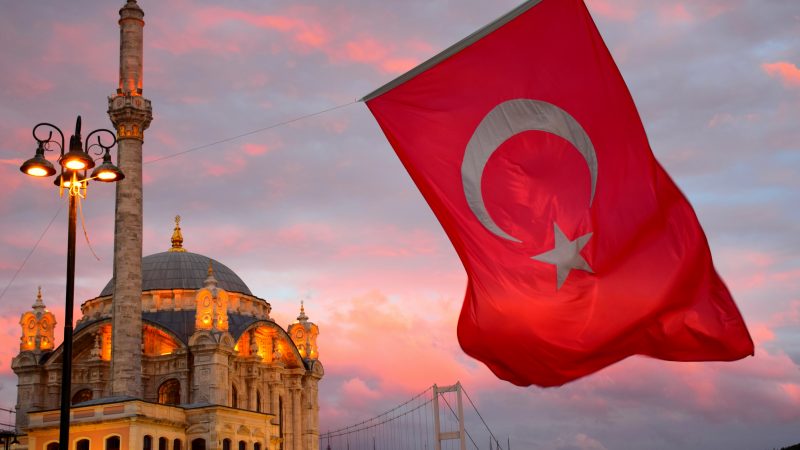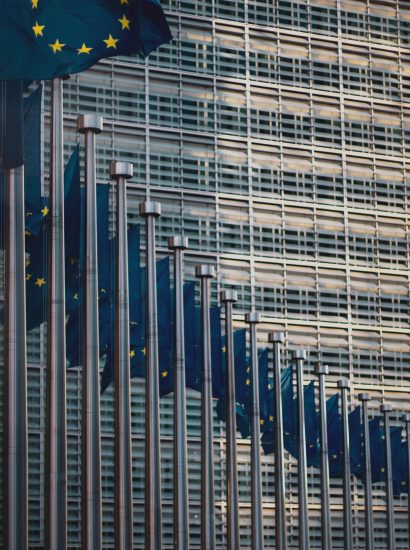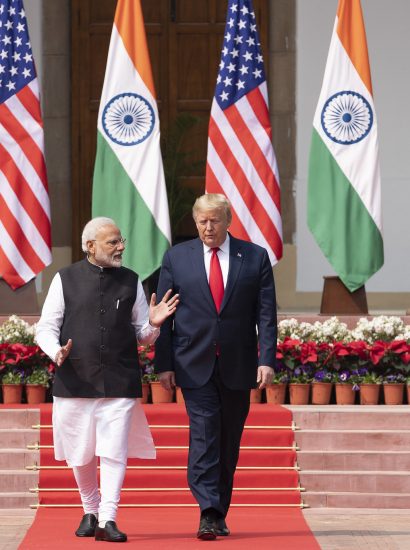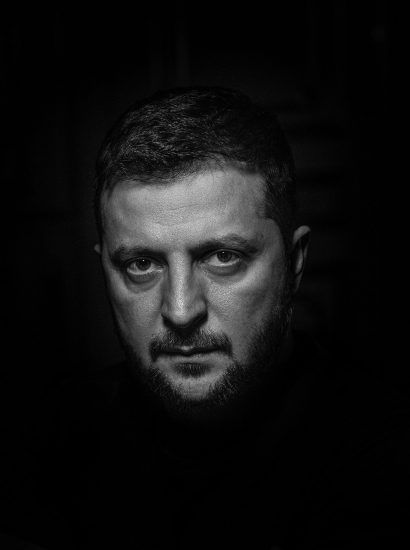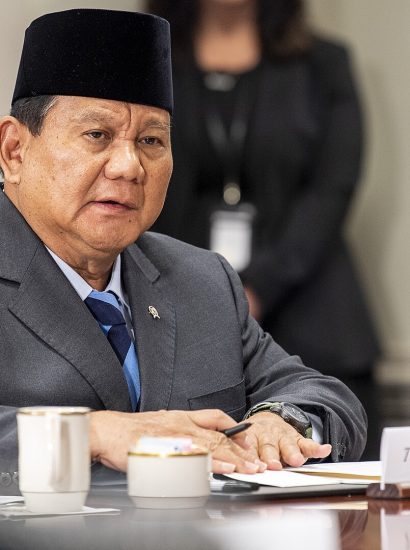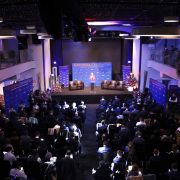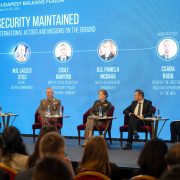The Republic of Turkey celebrated its centennial on October 29. On that day in 1923, Mustafa Kemal Ataturk founded a modern, secular, pro-western state. From the very beginning, the Turkish state has traditionally followed a Western path of development path based on Ataturk’s guidelines. This was true for Turkish foreign policy as well.
The country’s current leader, Recep Tayyip Erdogan also celebrated an anniversary: he was elected to prime minister twenty years ago. Erdogan and his Justice and Development Party (AKP) has sought to rebrand Turkey as a free agent and a global stakeholder in its own right. Erdogan also promised an organic continuation of the foreign policy outlined by Ataturk. However, after the (self-)coup against him in 2016, a major turnaround took place. By then, Erdogan felt strong enough to dismantle the remnants of Ataturk’s state model and to bring the army– the guardian of the republic – on his side. Turkey now portrays itself as an independent power with a unique national identity.
More recently, Erdogan used Turkey’s second century as a campaign motto, proclaiming “the Century of Turkiye” as a roadmap to lift the country “above the level of contemporary civilisations”. Ankara has navigated from the end of the Cold War through decades of turmoil in the Middle East, driven by one grand goal, to pursue its own interests.
Political Innovation or Just New Branding: Multi-Vector Foreign Policy
Former Turkish foreign affairs minister and ideologist, Achmet Davatuglo, defined Turkey’s place in the international community. The central idea is that the country is surrounded by different regions and that Turkish foreign policy concerning these regions is determined by distance and location, i.e. by geostrategic and historical-cultural (geocultural) ties.
Supporting Ukraine politically and militarily without entering into a direct confrontation with Russia has become the overwhelming priority of EU governments, the United Kingdom, the United States.
In that sense, Turkey’s political narrative has been dominated by the goal of becoming an autonomous middle power and the ambition of being a mediator between Moscow and Kyiv.
Turkey has supplied Ukraine with drones, supported a UN vote condemning Russia’s invasion, banned all combat ships from the Turkish Straits, and blocked Syria-bound Russian aircraft from Turkish airspace. In the meantime, Russia has agreed with Turkey to implement several crucial decisions: build the Akkuyu nuclear power plant, train hundreds of nuclear engineers and pay Turkey substantial advances in dollars; partner with Turkish oil refineries, allowing its crude oil to be exported to Turkey (without sanction).
To achieve goals of the multi-dimensional diplomacy, Ankara enlarged its embassy network, opened new routes for flag carrier Turkish Airlines, facilitated business deals and arms sales and cooperation in the military, education and social sectors. This policy became part of a more clearly structured foreign policy architecture and rests largely on the president’s personal role in Turkey’s near abroad.
Erdogan has engineered an assertive shift in foreign policy that focuses on expanding Turkey’s military and diplomatic footprint.
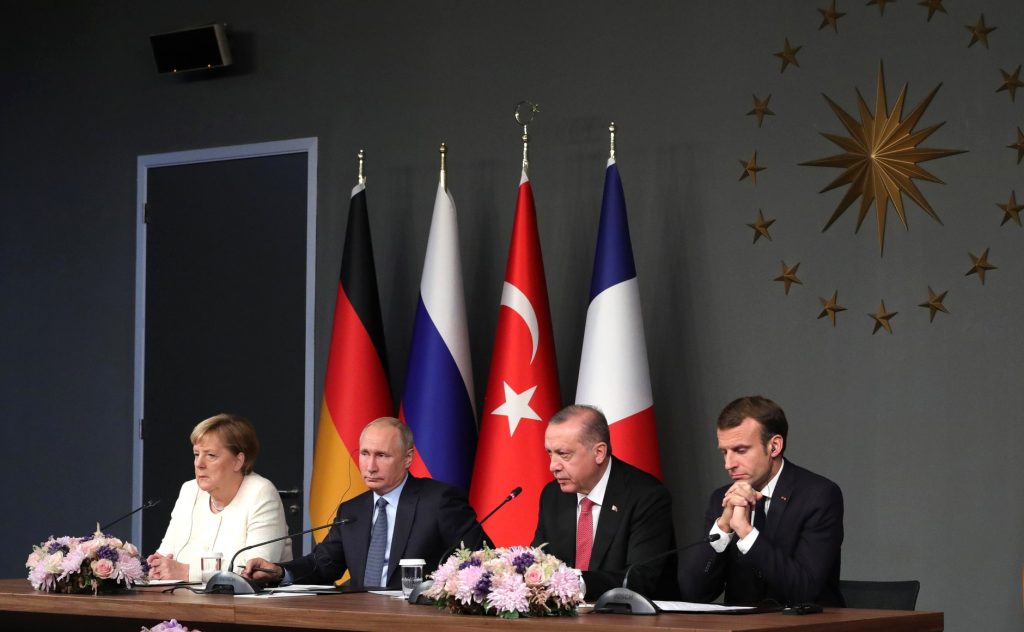
News conference following the meeting of the leaders of Russia, Turkey, Germany and France; Istanbul, Turkey in 2018 (Photo: Kremlin.ru / Wikimedia Commons)
To this end, Turkey has launched military interventions in countries including Azerbaijan, Iraq, Libya, and Syria; supplied partners such as Ethiopia and Ukraine with drones; and built Islamic schools abroad.
The AKP’s “zero problems with neighbors” policy
The main tool to create a safer environment of the country is broadcasting the model of Muslim democracy. The other tool is Turkey’s role as a mediator, acting as a benevolent power in conflicts in neighbouring regions. Ankara has also played a mediating role in conflicts of various kinds in the 21st century. Turkey was involved managing the 2006-08 crisis in Lebanon and mediated between Somalia and the breakaway Somaliland in 2013. Ankara’s successful intervention led to the conclusion of a trilateral trade agreement between Bosnia and Herzegovina and Croatia and Serbia in 2013. In addition, the Turkish military is participating in NATO/EU peacekeeping operations in both Bosnia and Kosovo.
Simultaneously, Turkey is trying to maintain good relations with the Balkans, the Gulf states and surprisingly with Israel. Despite Erdogan’s ardent support for Palestinian nationalism and anti-Semitic comments, the two countries share a common geo-economic goal, namely the natural gas reserve, which Israel discovered off its coast in 2010.
The most economically viable way to bring Israeli gas to Europe is via Turkey.
Turkish Foreign Policy Manoeuvres: Playing with Fire
President Erdogan wants to project Turkey’s power further, especially in the Middle East, where a receding U.S. presence has left a vacuum Ankara hopes to fill. But there are limits.
The “troubled partnership” with the United States is marked by ambivalence and mistrust. Putting all these factors together, we can say that Turkey’s foreign policy manoeuvres could pose a serious risk to Ankara’s security as well as that of the region.
Ankara’s military operations in northern Syria and its “balanced policy” between Russia and Ukraine have made Turkey’s foreign and security policy less consistent with its membership in the Atlantic Alliance. Erdogan’s authoritarian moves in domestic politics, along with the aforementioned military campaigns in the Middle East, are raising doubts among Turkey’s NATO partners and pushing it away from joining the European Union.
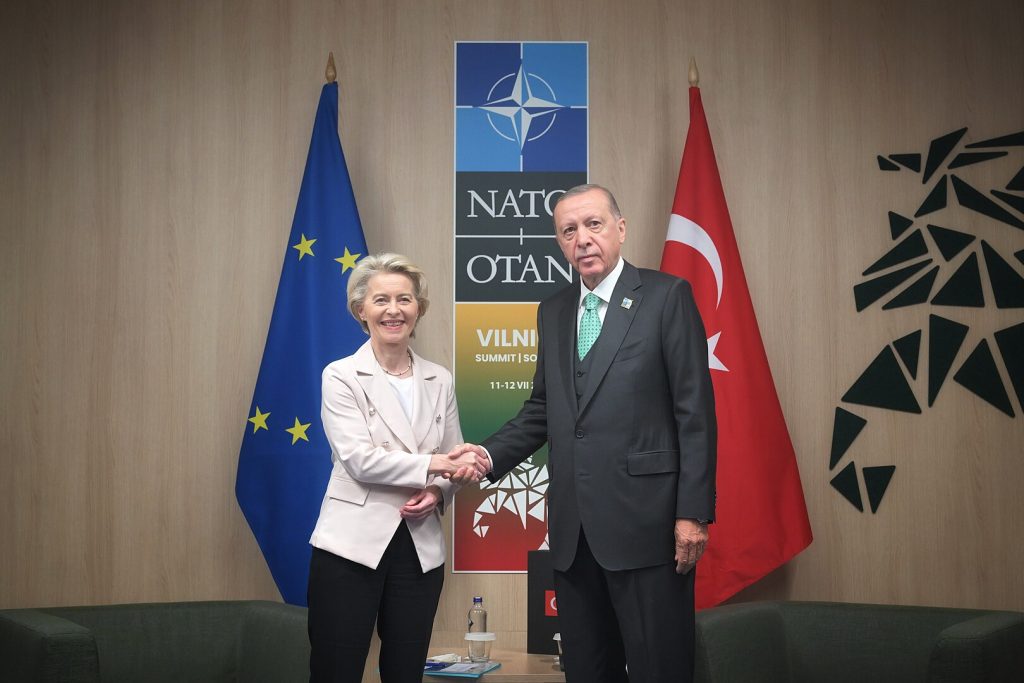
Ursula von der Leyen, President of the European Commission, and Turkish premier Recep Tayyip Erdogan at the NATO Summit in Vilnius on 11 and 12 July 2023 (Photo: Dati Bendo / European Commission)
All in all, we have to admit that Turkey’s undoubtedly relevant on a political and a military level. Only the economic level is missing. The country, which is poor in natural resources, depends on foreign financial flows – short-term and direct investment – and on foreign inflows of technology and innovation.
Ultimately, Turkey at 100 faces the challenge of reconciling its domestic and external ambitions with its structural economic constraints and massive rule of law deficits.

